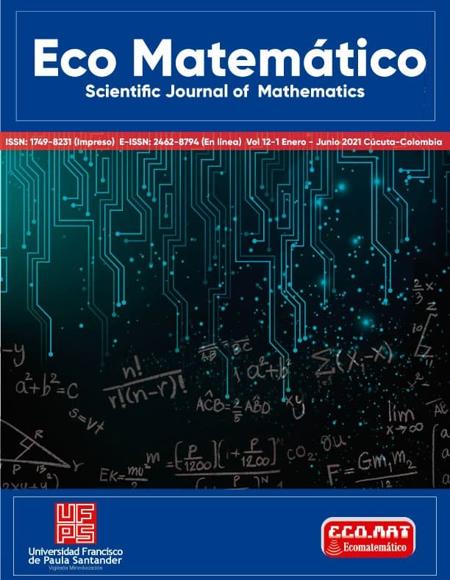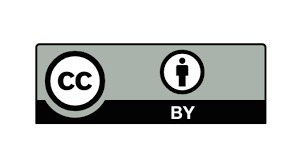Specialized knowledge of the teacher who teaches the reflection of the trigonometric function sine: Mediations with ICT
Conocimiento especializado del profesor que enseña la reflexión de la función trigonométrica: mediaciones con tic
Main Article Content
The implementation of ICT in the teaching of mathematics has become relevant today. For this reason, the training in this type of tools that the teachers who teach this area of knowledge have is key to its effectiveness in the classroom. In this way, the objective of this research is to characterize the specialized knowledge of the teacher who teaches the reflection of the trigonometric function sine through the use of ICT. The research is developed through a qualitative approach and an instrumental case study design, which is applied to a teacher of basic-secondary education who uses ICT within his pedagogical practices, specifically the specialized GeoGebra software. The main findings were evidences of the teacher's knowledge about the knowledge of the topics (KoT) and the teaching of mathematics (KMT) and the relationships that exist between these subdomains and categories of the MTSK, which are necessary in the knowledge approach It requires the teacher to teach sine function reflection effectively using ICT.
Downloads
Article Details
Acevedo-Rincón, J., y Flórez-Pabón, C. (2020). Matemáticas, Tecnología y Formación STEM. Congreso Iberoamericano de Educación Emergente CIED, 156 – 164
Ball, D., Thames, M., y Phelps, G. (2008). Content Knowledge for Teaching. What makes it Special? Journal of Teacher Education, 59(5), 389 - 407
Carrillo, J., Climent, N., Montes, M., Contreras, L., Flores, E., Escudero, D., Vasco, D., Rojas, N., Flores, P., Aguilar, A., Ribeiro, M., y Muñoz, M. (2018). The mathematics teacher’s specialized knowledge (MTSK) model. Research in Mathematics Education, 236-253, DOI: 10.1080/14794802.2018.1479981
Carrillo, J., Climent, N., Contreras, L., Muñoz, M. (2013). Determining specialized knowledge for mathematics. In Proceedings of the CERME, 8, 2985-2994
Carter, S. (2020). Case Study Method and Research Design: Flexibility or Availability for the Novice Researcher? En H. van Rensburg & S. O'Neil (Eds.), Inclusive Theory and Practice in Special Education (pp. 301-326). Hershey, Pennsylvanie: IGI-Global. 10.4018/978-1-7998-2901-0.ch015
Cayo, H., y Contreras, L. (2020). Algunos elementos claves del conocimiento especializado del profesor de matemáticas para la gestión de las relaciones área-perímetro. Educación Matemática, 32(2), 39-68. DOI: 10.24844/EM3202.02
Cullen, C., Hertel, J., y Nickels, M. (2020). The roles of Technology in Mathematics Education. The Educational Forum, 84(2), 166- 178. https://doi.org/10.1080/00131725.2020.1698683
Delgado, R., y Zakaryan, D. (2019). Relationships Between the Knowledge of Practices in Mathematics and the Pedagogical Content Knowledge of a Mathematics Lecturer. International Journal of Science and Mathematics Education, 1 – 21
Depaepe, F., Verschaffel, L., y Kelchtermans, G. (2013). Pedagogical content knowledge: A systematic review of the way in which the concept has pervaded mathematics educational research. Teaching and Teacher Education, 34, 12 – 25. DOI: 10.1016/j.tate.2013.03.001
Escudero, D., y Carrillo, J. (2020). El Conocimiento Didáctico del Contenido: Bases teóricas y metodológicas para su caracterización como parte del conocimiento especializado del profesor de matemáticas. Educación Matemática, 32(2), 1-38. DOI: 10.24844/EM3202.01
Fennema, E., y Franke, L. (1992). Teacher´s Knowledge and its impact. In. D.A. Grows (Ed). Handbook of research on mathematics teaching and learning, 147 – 164
Flores, E., Escudero, D., Montes, M., Aguilar, A., y Carrillo, J. (2014). Nuestra modelación del conocimiento especializado del profesor de matemáticas, el MTSK. Publisher Universidad de Huelva Publicaciones, 57 -72
Hernández-Sánchez, J., Borjón-Robles, E., y Torres-Ibarra, M. (2016). Dimensiones de la tecnología en la formación inicial de profesores de matemáticas: un estudio desde el currículum oficial. Eco Matemático. 7(1), 6–19. DOI: https://doi.org/10.22463/17948231.1008
Huda, R., y Qohar, A. (2021). Student Activeness and Understanding in Mathematics Learning Using GeoGebra Application on the
Trigonometry Radio Topic. AIP Conference Proceedings 2330, 040034 (2021); https://doi.org/10.1063/5.0043140
Krippendorf, K. (2013). Content Analysis: an introduction to its methodology. Thousand Oaks: Sage
Liñan, M. (2017). Conocimiento especializado en Geometría en un aula de 5° de primaria. Universidad de Huelva, Departamento de Didácticas Integradas.
MEN. (2016). Resolución 15683. Bogotá: MEN
OCDE (2019a). Estrategias de Competencia de la OCDE 2019. Competencias para construir un futuro mejor. Ed. 21 Fundación Santillana: OCDE
OCDE (2019b). Programme for International Students Assessment (PISA) Results from PISA 2018, Publishing in Paris. https://doi.org/10.1787/acd78851-en
Padilla-Escorcia, I. (2020). Una caracterización del conocimiento especializado del profesor de matemáticas para el uso efectivo de las TIC en la enseñanza. [Tesis de Maestría en Educación de la Universidad del Norte-Colombia]
Padilla-Escorcia, I., y Acevedo – Rincón, J. (2020). El Conocimiento especializado del profesor que enseña matemáticas: Mediaciones con TIC para las funciones trigonométricas. Série Educar Matemática, 43, 109 – 118. DOI: 10.36 229/978-65-86127-63-8
Padilla-Escorcia, I., y Conde-Carmona, R. (2020). Uso y formación en TIC en profesores de matemáticas. Revista Virtual Universidad Católica del Norte, (60), 116-136. https://www.doi.org/10.35575/rvucn.n60a7
Rowland, T., Huckstep, P., y Thwaites, A. (2009). Elementary Teacher´s Mathematics Subject Knowledge: The Knowledge Quartet and the Case of Naomi. Journal of Mathematics Teacher Education, 255 - 281
Shulman, L. (1986). Those Who Understand: Knowledge Growth in Teaching. American Educational Research Association, 4 – 14
Silverman, D. (2008). Doing qualitative research (2nd edition). Thousand Oaks: Sage Publication.
Stake, R. (2010). Qualitative research. Studying how things work. The Gilford Press. New York - London
Stein, H., Gurevich, I., y Gorev, D. (2020). Integration of technology by novice mathematics teachers – what facilitates such integration and what makes it difficult? Education and Information Technologies, 25(1), 141 -161. https://doi.org/10.1007/s10639-019-09950-y
UNESCO. (2017). E2030: Educación y Habilidades para el Siglo XXI. Santiago de Chile. UNESCO
Zamora-Aray, J., Ramirez-Jiménez, J., y Delgado-Navarro, F. (2020). Uso de herramientas tecnológicas y su impacto en el rendimiento en el curso de Cálculo II de la Universidad Nacional. Eco Matemático, 11(1), 6-17. http://dx.doi.org/10.1016/j.eq







